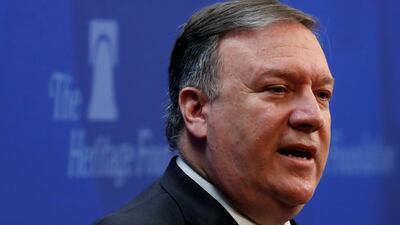The ink was barely dry on the 2015 Iran nuclear deal when Mike Pompeo, then a congressman, was pointing out its flaws in a speech to the US's Heritage Foundation. Less than three years later, he was back in the same venue as Secretary of State to paint a grave picture of the scenario he presaged. Much of what he predicted has come to pass: the Iranian regime is now "the world's largest sponsor of terror". Tens of billions of dollars in sanctions relief, which should have gone towards helping its own people, have been funnelled towards "kleptocrats", ballistic and cruise missiles to target its neighbours and proxy wars in Yemen, Lebanon, Iraq and Syria. The deal, he said, gave it "carte blanche" to dominate the Middle East.
Mr Pompeo's exposition of the US's new approach to Tehran put flesh on the bones of Donald Trump's decision to pull out a fortnight ago. None of Mr Pompeo's predecessors have gone so far before in spelling out Tehran's nefarious activities and actively sought to curtail rather than pander to them. In the face of a regime engaged in missile proliferation and regional destabilisation, which threatens the sovereignty of Arab countries while simultaneously keeping its own people impoverished, only a firm stance will do.
Underpinning the new US approach is the threat of “the strongest sanctions in history”. Mr Pompeo’s 12 demands target key elements of Iran's malign influence, from nuclear enrichment to missile proliferation, the support of terrorists and threatening behaviour. They back the measures this region has long called for in curtailing Tehran’s attempts at regional domination. While Iran might have stuck to the terms of the deal regarding nuclear proliferation, its missile programme has undoubtedly undercut international law set by the UN. Although unenforceable, they set the terms of "global norms" Mr Pompeo said should be respected and adhered to. Significantly, he did not close the door on a future new deal and said he would be willing to re-establish diplomatic and commercial channels and drop sanctions if Tehran showed itself capable of reform.
Iranian President Hassan Rouhani has reacted with a predictable lack of reason while Europeans have dismissed his demands and reiterated their commitment to the original deal. But it is not European but Arab lands that are continuously under threat from the Iranian Revolutionary Guard Corps, whose commander, Qassem Suleimani, has been the instigator of so much of Iran's aggression. As Anwar Gargash, the UAE's Minister of State for Foreign Affairs, said, Mr Pompeo's much-needed tough stance was a "natural result of Iran's behaviour over the years". That behaviour over decades has led to the illegal seizure of the Greater and Lesser Tunbs islands in 1971 and the funding of Iran-linked militia by Qatar.
Monday’s speech suggests a bold new approach. Where once there was confusion, there is now a plan. The Trump administration, in concert with its Arab partners, is determined to halt Iran’s march across the Middle East. Only severe and unremitting economic pressure will bring Tehran to the table.

